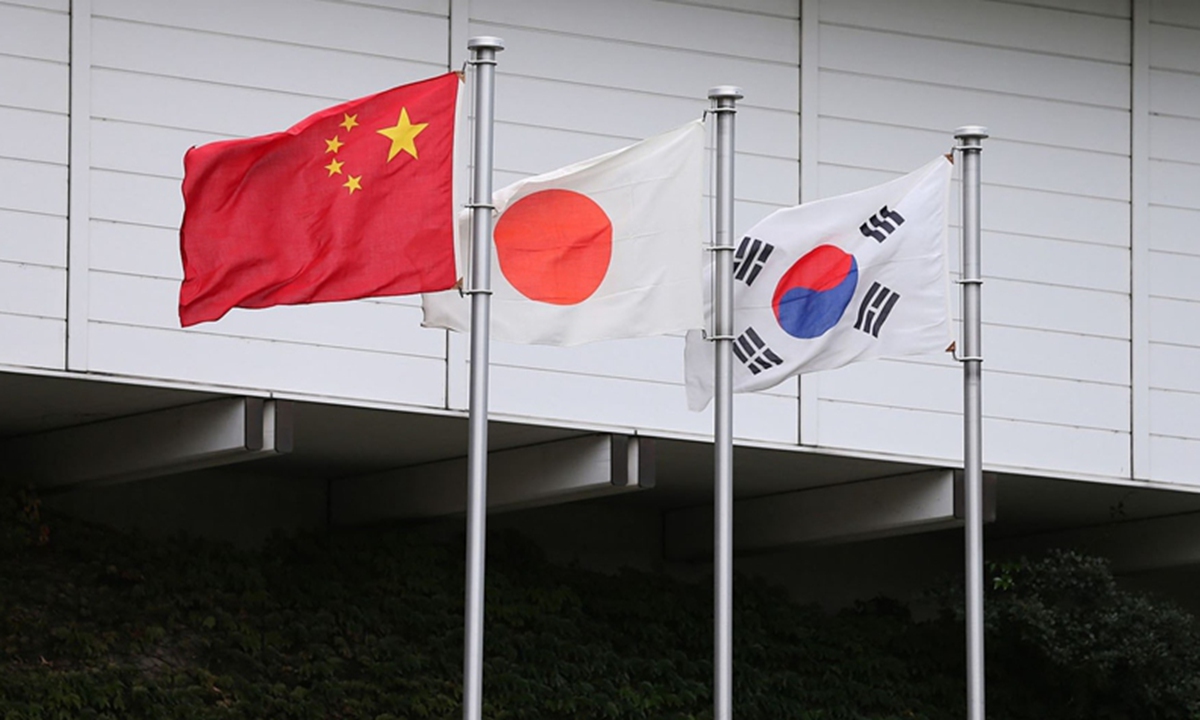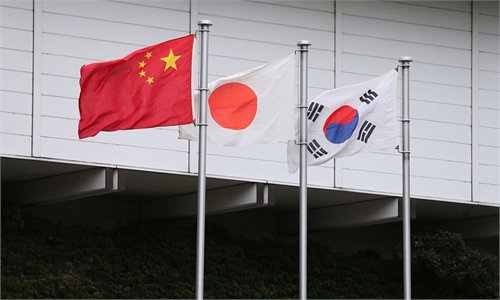China-Japan-ROK cooperation embarks on new journey as trilateral leaders' meeting resumes: Global Times editorial

China Japan South Korea File photo:CGTN
The ninth Trilateral Summit Meeting among China, Japan and South Korea is being held from Sunday to Monday in Seoul, South Korea. Chinese Premier Li Qiang, Japanese Prime Minister Fumio Kishida, and South Korean President Yoon Suk-yeol attend the meeting to exchange views on China-Japan-ROK cooperation. Hopefully this meeting is taken as an opportunity to inject new momentum into China-Japan-ROK cooperation, better realize mutual benefits and win-win situation among the three countries, and make new contributions to the peace, stability and prosperity of the region and the world.
The last trilateral leaders' meeting was held in December of 2019. Since then, the mechanism was put on hold due to the COVID-19 pandemic and other factors. One of the most important reasons why the trilateral meeting can be restarted after four years and five months is the joint efforts made by the three countries over the past year. From the International Forum for Trilateral Cooperation (IFTC) in July last year, to the Trilateral Senior Officials' Meeting at deputy foreign minister-level held in Seoul in September, a consensus was reached on holding the China-Japan-ROK leaders' meeting at the earliest convenient time. Then to the Japan-China-ROK Trilateral Foreign Ministers' Meeting in November, the three parties agreed to create conditions for the leaders' meeting and speed up preparation. It is based on the step-by-step and solid promotion of the three parties that the China-Japan-ROK leaders' meeting was successfully held.
The resumption of the trilateral summit meeting means that cooperation between the three countries will resume, which is crucial to promoting regional prosperity and development and maintaining regional peace and stability. China, Japan and South Korea are important economies in the world. Their combined population accounts for 20 percent of the world's total, and their combined GDP is roughly 25 percent of the global total. In the current context where the regional economy is facing many risks and challenges, but new patterns and new trends are still taking shape, a renewed cooperation between China, Japan and South Korea will not only inject more confidence into regional prosperity and stability, but also create new growth points for regional development. For example, China, Japan and South Korea each have market, financial and technological advantages in the semiconductor field. The cooperation between the three countries will contribute to the stability and development of the regional and even global semiconductor industry supply chain.
At the same time, the US has vigorously intervened in the affairs of Northeast Asia in recent years and provoked confrontation among regional camps. It has either roped in Japan and South Korea to join various closed and exclusive small circles to build "small courtyard with high walls" in the field of science and technology, or it has drawn ideological lines by promoting the camp confrontation rhetoric of "China, Russia and North Korea VS the US, Japan and South Korea." This not only undermines the relationship between China and Japan and South Korea as close neighbors and interferes with cooperation between China, Japan and South Korea, but also provokes a "new Cold War" in the region and aggravates regional security dilemmas. Against this realistic background, the leaders of China, Japan and South Korea gathered together for frank communication and dialogue, which reflects the rational return of Japan and South Korea's policies toward China and the warming of the political atmosphere among the three countries. Moreover, it also provides a chance to eliminate the uncertainty in trilateral relations.
The recent China-Japan-South Korea leaders' meeting was significant given it had not occurred for some four years and five months. Looking back since the first such gathering in December of 2008, gaps of several years between subsequent meetings have not been uncommon. For example, the sixth meeting in November 2015 reconvened after a 3.5-year interval, and the seventh in May 2018 followed a 2.5-year gap. Undoubtedly, historical issues like comfort women and territorial disputes, as well as security factors like THAAD, have contributed to lack of political trust due to insufficient mutual understanding. However, a deeper reason may lie in cognitive misalignment by Japan and South Korea arising from China's comprehensive development. Added to increased US containment of China, it has made independent and autonomous China policies difficult for the two countries. As a result, Japan and South Korea have faced recurring "dilemmas of choice" regarding China-Japan-ROK cooperation. In fact, their recent proactive stance on leaders' meetings contains an intentional strategic adjustment, seeking to repair their relations with China damaged by previous excessive "pro-US" stances.
Given this context, on the 25th anniversary of China-Japan-South Korea cooperation, this leaders' meeting should not only review past processes and achievements but reaffirm initial commitments and strategic direction. The countries should implement the consensus including Trilateral Cooperation Vision for the Next Decade. In a new historical stage, they must strengthen coordinated strategies and policy convergence, quickly find updated self-positioning, re-evaluate neighbors' strategies, and rebuild relationship orientations through in-depth strategic dialogue. They should endeavor to minimize external interference such as from the US and work diligently together to advance tripartite cooperation to a new level.
While China, Japan and South Korea have differences in aspects like social systems and development stages, it is understandable that divergences may emerge on some specific issues. However, the important thing is to enhance mutual understanding and find consensus through sincere communication and dialogue. Past history cannot be easily changed, but the future can be shaped jointly among China, Japan and South Korea. Amid the accelerating changes of the current era, hopefully the three countries will tackle challenges head on based on their solid foundation of cooperation. Proceeding together in a cooperative spirit, they can promote deeper, more substantive tripartite partnership to continually contribute to regional and world peace, stability and prosperity.


